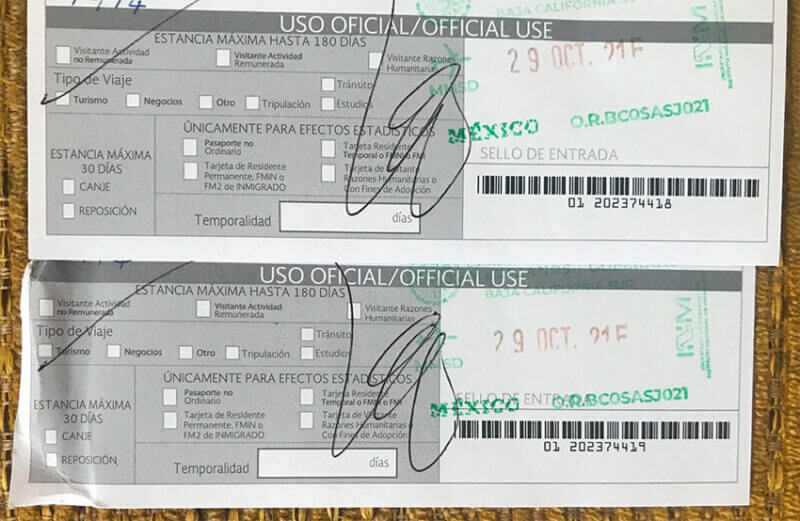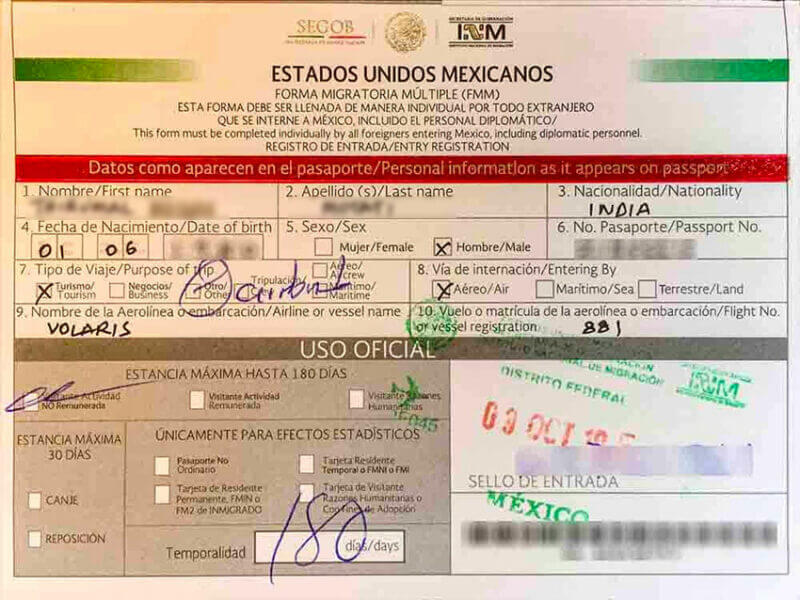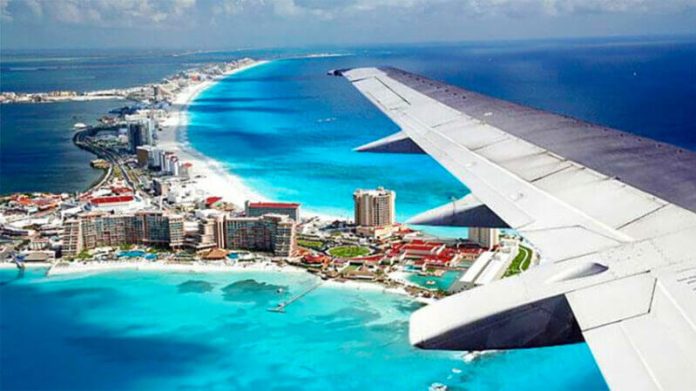It once was all but guaranteed that a visitor entering Mexico would receive a permit to stay for 180 days, the maximum length of time allowed under current Mexican immigration rules.
But many aspects of immigration policy have been changing over the past few years, and length of stay for visitors appears to be one of them. More and more travelers have been reporting that they were allowed 30 or fewer days to complete their travels in Mexico.
A visitor’s permit, known as a forma migratoria múltiple (FMM), allows the permit-holder to be in the country for “a maximum validity of 180 days,” according the National Immigration Institute’s (INM) website. For the United States, Canada, Australia and much of Europe, it is the only Mexican-issued document needed to travel within the country - a visa is not required.
The immigration agent at the point of entry (an airport, land border or seaport) fills in a portion of the FMM and writes the number of days the visitor is permitted to stay in the country. The agent may also ask for documents like hotel reservations, return flights or tours booked to prove that the purpose of the visit is that which the visitor is claiming.
None of that is new. What is new is that “maximum 180 days” no longer means 180 days by default. Instead, social media reports and immigration experts indicate that an increasing number of people are receiving 30 days or less on their visitor’s permit, rather than the 180.

Though the INM has not released an official public statement on the change of policy, an INM official in Mazatlán, Sinaloa, acknowledged having heard of the issue but said the manner in which the federal criteria for entry is applied is at the full discretion of the agent at the point of entry. While some nationalities face restrictions, visitors from countries without restrictions still “supposedly” get 180 days, the agent said.
An agent on the INM help line was similarly brief in the information she was able to provide.
“We don’t have information about the reasons they are giving less time …” the agent said. “We don’t know if they have received some notification or internal memo.”
She did, however, have advice for incoming travelers.
“You have to show your return flight, that you have economic solvency … if you have tickets for tours, tickets for where you’re going to stay, it is also necessary to mention that,” she said.
Guy Courchesne, a Mexico City-based recruiter of foreign teachers who also works on immigration issues, said that he gets at least 20 calls a day on the topic of changing FMM lengths of stay, mostly from people who expected to get 180 days but received as few as 10, with no recourse to extend the permit. The change appears to be affecting travelers of all nationalities, he said.
Earlier this year, one option for people with expired documents was to get temporary residency through a pandemic amnesty program. But that program was for people whose expired travel documents were issued prior to 2019, so more recent arrivals do not qualify, Courchesne said.
Many travelers have flocked to Facebook to discuss the changes and share their personal experiences. Though the majority still report receiving the standard 180 days, those that receive less have been frustrated by reports that many local INM offices no longer offer FMM extensions.
Some users have even recounted being advised by agents to overstay their permits and pay for a new one at the airport when they leave. Though feasible, this option presents the risk of detention and deportation if at any point authorities ask undocumented travelers to prove that they are legally in the country.
Facebook user Alex Ward of the U.K. had to consider that and other options when he received a shorter-than-expected length of stay on his FMM. Ward arrived in Cancún for a 15-day vacation with his partner at the end of October. After leaving the airport, a friend advised him to check the length of stay on his immigration document; to his disappointment, he was only given 10 days.
“Really weird and total downer on the holiday since we are literally here for two weeks and the agent who issued it seemed very friendly at the time and asked us how long and where we were going …” Ward wrote on Facebook.
“We are here for a relaxing [beach] holiday but now will be concerned about this. Not a good way to encourage tourism …. [Probably] won’t come back to Mexico after this which is a real shame as I love it.”

Ward’s experience appears to be the exception, rather than the rule. The majority of social media users on the Facebook group Expats in Mexico report receiving the full 180 days, even when they intend to stay only for a few days.
One such Facebook user was Canadian traveler Rhiannon Mariah. She was worried after another Canadian friend was given only 30 days on her FMM. To avoid getting her trip cut short, Mariah decided to fill out her FMM online, where the length of stay is automatically set to 180 days.
Though the immigration agents at the airport have the discretion to change that number, in her case they did not: she was given the full six months.
Some social media users have claimed that repeat travelers are especially likely to get shorter stays. For at least some returning travelers, that appears to be true. Oscar Alvarenga of Honduras flew into Mexico City hoping to spend several months traveling while working remotely online. It was his second trip to Mexico this year, and he was surprised to receive only 45 days on his FMM. He asked for an extension but was denied.
“I told [the agent] that the last time I came to Mexico, five months ago, I received 180 days. But he told me he was not able to do it again,” Alvarenga said.
Though most people still appear to be receiving 180 days on their visitors’ permits, travelers must increasingly adhere to a motto that is applicable to many aspects of life in Mexico: be ready for anything.
Proof of a return flight, hotel stay and documents demonstrating adequate funds for the duration of the trip can strengthen a visitor’s case to get the permit length they want. And for those hoping to live in Mexico for less than a year, temporary residency is often a viable option.
Mexico News Daily
